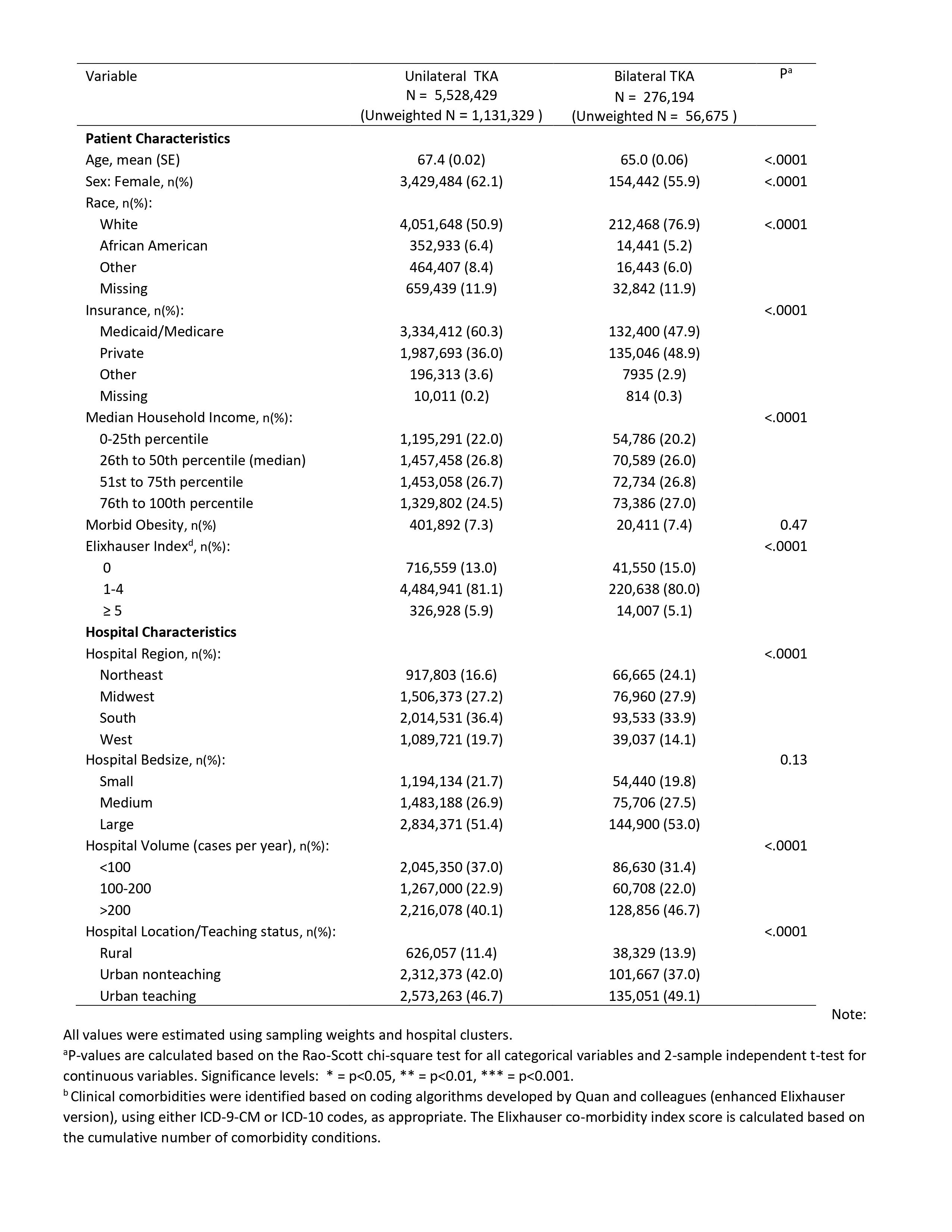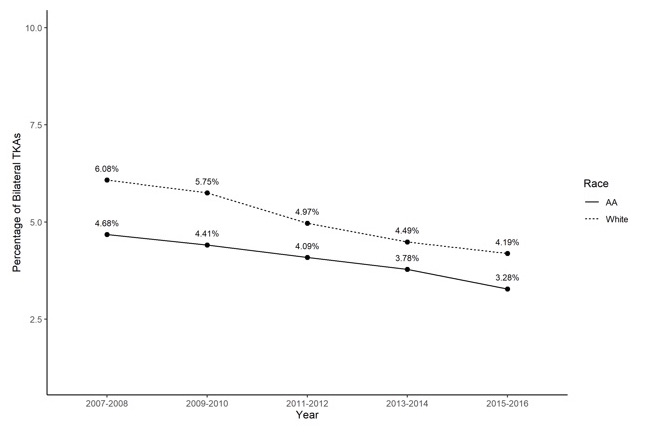Session Information
Session Type: Poster Session D
Session Time: 9:00AM-11:00AM
Background/Purpose: Compared to White Patients, African Americans (AAs) are reported to have lower utilization and higher complication rates outcomes in Unilateral Total knee arthroplasty (UTKA). It is unclear whether racial variations exist for Bilateral TKA (BTKA)
Methods: In this retrospective analysis, we sought to examine BTKA vs UTKA utilization and in-hospital complications comparing AAs and Whites. Using the National Inpatient Sample (NIS)- Healthcare Cost and Utilization Project (HCUP) database (2007-2016), we computed differences in temporal trends in utilization and major in-hospital complication rates of BTKA vs UTKA comparing AAs and Whites. All patients ≥ 50 years who underwent elective primary TKA were included. We performed multivariable logistic regression models to assess racial differences in trends adjusting for individual (age, sex, Elixhauser comorbidity index, and morbid obesity), hospital level (hospital volume, bed size, region and teaching status) and community level (median household income) variables. Discharge weights were used to enable nationwide estimates. We used multiple imputation procedures to impute values for 12% missing race information.
Results: An estimated 276,194 BTKA and 5,528,429 UTKA were performed in US. The proportion of BTKA amongst all TKAs declined from 5.53% in 2007-08 to 4.03% in 2015-16. AAs were significantly less likely to undergo BTKA compared to Whites throughout the study period (4.68% in AAs vs 6.08% in Whites in 2007-08, whereas 3.28% AAs vs 4.19% Whites in 2015-16, trend P < 0.001). In-hospital complication rates for UTKA were higher in AAs compared to Whites throughout the study period (1.35% Whites vs 1.50% AAs, 2007-08, 1.00% Whites vs 1.35% AAs in 2015-16, trend P < .0001). However, for BTKA, the in-hospital complication rates varied between Whites and AA throughout the study period (1.21% Whites vs 1.27% AAs, 2007-08; 1.03% Whites vs. 1.08% AAs, 2011-12; 0.86% Whites and 0.92% AAs, 2015-16, trend P = 0.09).
Conclusion: In this nationwide sample of patients from 2007-2016 who underwent total knee arthroplasty, the utilization rate of BKTA was higher in Whites compared to AAs. On the other hand, while AAs have consistently higher in-hospital complication rates in UTKA over the time period, this pattern was not consistent for BTKA.
 Weighted frequencies and percentages of demographic characteristics among unilateral TKA vs. bilateral TKA.
Weighted frequencies and percentages of demographic characteristics among unilateral TKA vs. bilateral TKA.
 Utilization of Bilateral Total Knee Arthroplasty (TKA) amongst all TKAs stratified between Whites and African Americans.
Utilization of Bilateral Total Knee Arthroplasty (TKA) amongst all TKAs stratified between Whites and African Americans.
 Unilateral and Bilateral Total knee Arthroplasty in-hospital Complications in Whites and African Americans
Unilateral and Bilateral Total knee Arthroplasty in-hospital Complications in Whites and African Americans
To cite this abstract in AMA style:
Mehta B, Ho K, Bido J, Memtsoudis S, Parks M, Goodman S, Russell L, Ibrahim S. Bilateral vs Unilateral Total Knee Arthroplasty: Racial Variation in Utilization and In-Hospital Major Complication Rates [abstract]. Arthritis Rheumatol. 2020; 72 (suppl 10). https://acrabstracts.org/abstract/bilateral-vs-unilateral-total-knee-arthroplasty-racial-variation-in-utilization-and-in-hospital-major-complication-rates/. Accessed .« Back to ACR Convergence 2020
ACR Meeting Abstracts - https://acrabstracts.org/abstract/bilateral-vs-unilateral-total-knee-arthroplasty-racial-variation-in-utilization-and-in-hospital-major-complication-rates/
